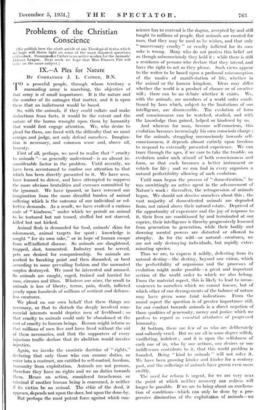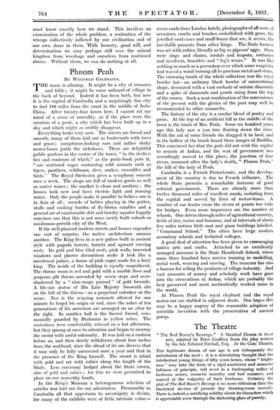Problems of the Christian Conscience
[ We publish here the ninth article of our Theological Series which we hope will throw light on some of the most disputed questions of Conduct.. Commander Cather is an active worker for the Animals' Defence League. Next week we hope that Miss Frances Pitt will write on the same subject.]
IX.—A Plea for Nature
BY COMMANDER J. L. CATHER, R.N.
IVO a peaceful people, through whose territory a marauding army is marching, the objective of that army is of small importance. It is the nature and the number of its outrages that matter, and it is upon these that an indictment would be based.
So, with the animals; if they could collate and make deductions from facts, it would be the extent and the nature of the harms wrought upon them by humanity that would first engage attention. We, who desire to plead for them, are faced with the difficulty that we must arraign and judge, not only defend ourselves. Imagina- tion is necessary, and common sense and, above all, honesty.
First of all, perhaps, we need to realize that " cruelty to animals "—as generally understood—is an almost in- considerable factor in the problem. Until recently, we have been accustomed to confine our attention to that which has been directly presented to it. We have seen, have learned to detest, and have attempted to suppress the more obvious brutalities and excesses committed by the ignorant. We have ignored, or have screened our • imagination from the more dreadful burden of animal suffering which is the outcome of our individual or col- lective demands. As a result, we have evolved a curious code of " kindness," under which we permit an animal to be tortured but not teased, stuffed but not starved, killed but not kicked.
Animal flesh is demanded for food, animals' skins for adornment, animal targets for sport : knowledge is sought " for its own sake," or in hope of human escape from self-inflicted disease. So animals are slaughtered, trapped, shot, tormented. Industry must be served, pets are desired for companionship. So animals are worked to breaking point and then discarded, or bred according to some prevailing fashion and the unwanted surplus destroyed. We must be interested and amused.
So animals are caught, caged, trained and harried for zoos, circuses and films. Whatever our aims, the result to animals is loss of liberty, terror, pain, death, inflicted yearly upon hundreds of millions of sentient and defence- less creatures.
We plead on our own behalf that these things arc necessary, or that to disturb the deeply involved com- mercial interests would deprive men of livelihood : so that cruelty to animals could only be abandoned at the cost of cruelty to human beings. Reason might inform us that millions of men live and have lived without the aid of these necessaries, and that the supporters of every injurious traffic declare that its abolition would involve injustice.
• Again, we invoke the casuistic doctrine of " rights," declaring that only those who can assume duties, or enter into a contract, are entitled to self-control, freedom, immunity from exploitation. Animals are not persons, therefore they have no rights and we no duties towards them. Hence an action, considered treacherous or criminal if another human being is concerned, is neither if its victim be an animal. The ethic of the deed, it appears, depends not upon the doer, but upon the done-by.
But perhaps the most potent force- against .which con- science has to contend is the dogma, accepted by and still taught to millions of people, that animals are created for man, that they may be used as he wishes, and that only " unnecessary cruelty " or cruelty inflicted for its own sake is wrong. Many who do not profess this belief act as though subconsciously they hold it : while there is still a residuum of persons who declare that they intend, and have the right to act as they please. Such views appear to the writer to be based upon a profound misconception of the modes of manifestation of life, whether in the animal or the human kingdom. Ideas may differ whether the world is a product of chance or of creative will ; there can be no debate whether it exists. We, with the animals, are members of a world order condi- tioned by laws which, subject to the limitations of our intelligence, are discoverable. The evolution of form and consciousness can be watched, studied, and with the knowledge thus gained, helped or hindered by us.
And whereas for man, become self-conscious, this evolution becomes increasingly his own conscious charge ; for the animals, struggling unconsciously towards self- consciousness, it depends almost entirely upon freedom to respond to externally presented experience. We can trace through the ages, if we care to take the trouble, an evolution under such stimuli of both consciousness and form, so that each becomes a better instrument or vehicle for life ; and we can find in every organism a natural perfectibility allowing of such evolution.
Until man began the process of " domestication," he was unwittingly an active agent in the advancement of Nature's work : thereafter, the retrogression of animals began. We should not deceive ourselves about this : the vast majority of domesticated animals are degraded from, not raised above their natural estate. Deprived of the opportunity of experience and the joy of response to it, their lives are conditioned by and terminated at our caprice, their intelligence is thereby progressively lessened from generation to generation, while their bodily and dawning mental powers are distorted or allowed to atrophy. As for the wild—or natural—creatures, we are not only destroying individuals, but rapidly exter- minating species.
Thus we are, to express it mildly, deflecting from its natural destiny—the destiny, beyond our vision, which the perfectibility of organisms and the processes of evolution might make possible—a great and important section of the world order to which we also belong. From the material aspect, this is likely to lead to incon- veniences to ourselves which we cannot foresee, but of which other of our derangements of the balance of nature may have given some faint indications. From the moral aspect the question is of greater importance still, for our conduct towards animals is a direct negation of those qualities of generosity, mercy and justice which we profess to regard as essential attributes of progressed humanity.
At bottom, there arc few of us who are deliberately and callously cruel. But we are all in some degree selfish, vacillating, indolent ; and it is upon the selfishness of each one of us, who by our actions, our desires or our indifference contribute to it, that this world problem is founded. Being " kind to animals " will not solve it. We have been growing kinder and kinder for a century past, and the sufferings of animals have grown even more swiftly.
The need for reform is urgent, for we arc very nea the pOint at which neither recovery nor redress will longer be possible. If we arc to bring about an ameliora- tion of conditions—which can only be done by a pro- gressive diminution of the exploitation of animals—we must know exactly how we stand. This involves an examination of the whole problem, a realization of the wrongs collectively inflicted by our civilization and of our own share in them. With honesty, good will, and determination we may perhaps still save the animal kingdom from wreckage and ourselves from continued shame. Without them, we can do nothing at all.











































 Previous page
Previous page